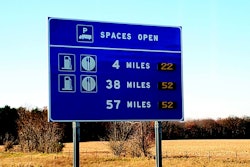As a result of a lawsuit from the Western States Trucking Association (WSTA) challenging the California Air Resources Board’s (CARB) Advanced Clean Fleets (ACF) regulation, CARB has announced two clarifications to the rule to clear up some uncertainty around how it could be enforced.
Notably, CARB is still awaiting a ruling from the Environmental Protection Agency on whether the regulation will receive a Clean Air Act waiver, which would allow the ACF to take effect.
CARB needs that waiver before implementing ACF. It's the companion rule CARB promulgated alongside the Advanced Clean Trucks rule, which sets sales requirements for so-called "zero emissions" (ZEV) trucks within the state. The ACF, on the other hand, requires certain fleets -- namely port drayage operations and “high-priority” fleets with 50 or more trucks or those with more than $50 million in annual revenue -- to purchase and operate the trucks on various timetables.
EPA recently wrapped up a comment period fielding comments on why it should or should not grant the waiver. The timeline for a final waiver ruling is currently unknown.
[Related: Calif. small fleet, advocate: CARB policies don't reflect reality, pushing out independents]
In the event that CARB does receive the waiver, WSTA has reached two agreements with CARB related to the ACF; one clarifies just who the "high-prority" fleets under the ACF are, while the other offers a measure of leniency for those fleets when it comes to potential "retroactive" enforcement.
First, CARB on Oct. 16 retracted a Frequently Asked Questions document from November 2023. That document answered questions related to common ownership and control as it relates to ACF compliance.
WSTA said the FAQ contained statements “that appeared to broaden the definition of ‘Common Ownership and Control’ so as to make more independent trucking fleets subject to the ACF zero-emissions truck purchase mandate.” WSTA objected to the FAQ as “underground regulation” that expanded the ACF regulation’s applicability that was inconsistent with the actual text of the rule.
[Related: Trucking to EPA: Send CARB 'back to drawing board' for its ZEV truck-purchase mandates]
Joe Rajkovacz, WSTA’s Director of Governmental Affairs and Communications, said WSTA’s concern with the old FAQ was that CARB “was really intimating” that if an independent owner-operator hauled exclusively for one broker, the broker could fall under the ACF’s purview if the cumulative number of trucks they were working with added up to at least 50. Essentially, hauling for just one broker could have established “control” in a broker-carrier relationship.
Rajkovacz noted the many owner-operators who only haul Amazon freight as examples of those who could be caught up in the ACF had the FAQ remained in place.
“That was a real concern with our broker members … because they were like, ‘Well, how the hell do I tell the one-truck guy that he’s got to convert to an electric truck?’” Rajkovacz added.
WSTA said it considered the FAQ retraction “a partial victory in our efforts to reduce zero-emissions truck mandates for both our members and non-members until the truck technology works, infrastructure is built out and accessible, and the total cost of ownership is on par with today’s fleet operations.”
[Related: More lawsuits filed against CARB over Advanced Clean Fleets]
A second agreement announced Oct. 25 by CARB related to how the ACF -- which was originally set to begin Jan. 1, 2024 -- would be enforced if EPA grants the Clean Air Act waiver.
In an updated Enforcement Notice, CARB said it will not retroactively enforce the ACF regulations against high-priority fleets (again, those with 50 or more trucks, or more than $50 million in annual revenue). CARB said that it “has decided to exercise its enforcement discretion to not seek -- and CARB will not ask the Attorney General to seek -- monetary penalties” against high-priority fleets for ACF violations that occur between Jan. 1, 2024, and 90 days after the date the EPA takes final action on the waiver and authorization of the regulation.
The updated Enforcement Notice does not mention any changes to enforcement against drayage fleets, which, under the ACF, are barred from registering new diesel trucks to work at ports and rail yards in the state after Jan. 1, 2024. Even though the rule was put on hold until the EPA’s waiver ruling, and drayage fleets have been allowed to register diesels this year, the original Enforcement Notice said fleets that added any internal combustion engine vehicles to CARB’s reporting system after Dec. 31, 2023, should expect to receive the following notice:
“The Advanced Clean Fleets Regulation (Regulation) - Drayage truck requirements deadline to report combustion-powered vehicles for drayage truck operation was December 31, 2023. Any combustion-powered vehicles added to the reporting system that were not previously reported by December 31, 2023, may be restricted from performing drayage services once the U.S. Environmental Protection Agency grants California a waiver for the Regulation pursuant to section 209 of the federal Clean Air Act or determines that no such waiver is necessary.”
Essentially, any diesel-powered trucks added to CARB’s reporting system this year will likely be removed and no longer allowed to perform drayage operations in California.
[Related: Trucking groups, fleets urge EPA to deny waiver for CARB's diesel ban]











